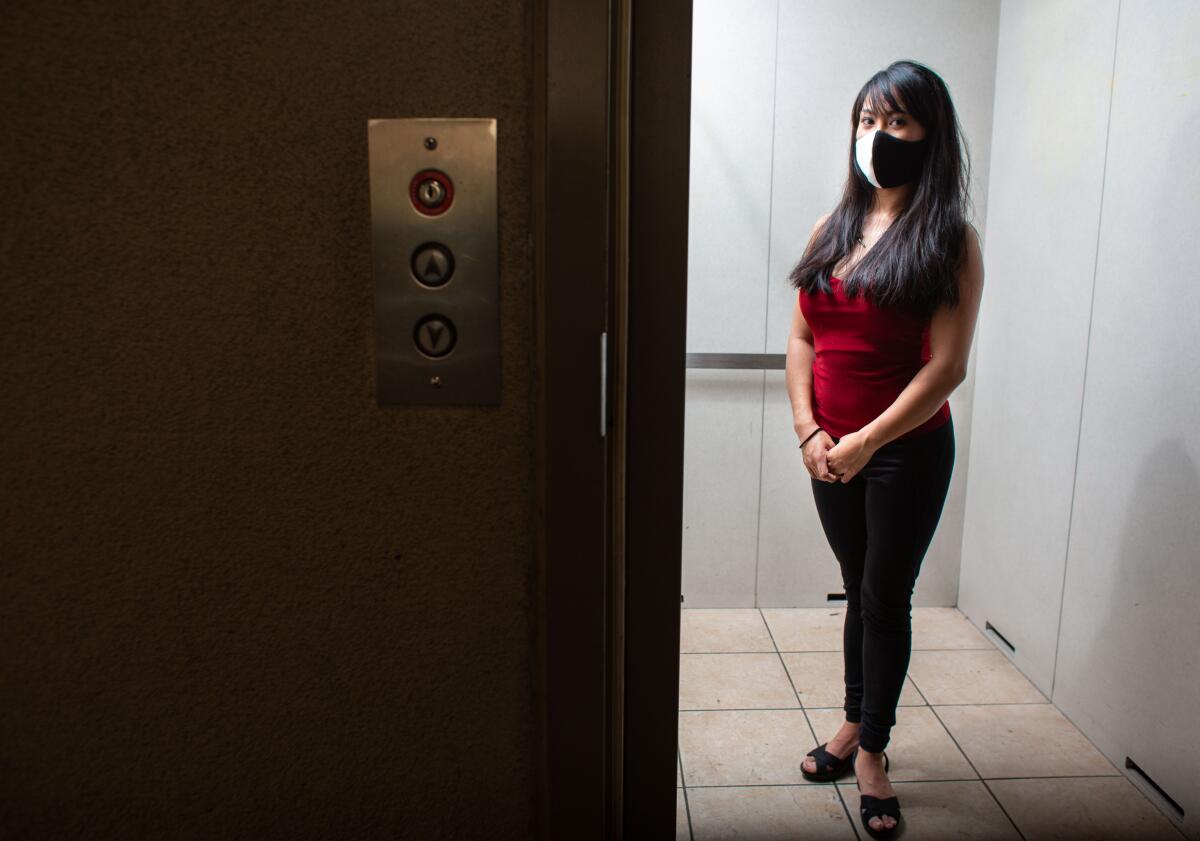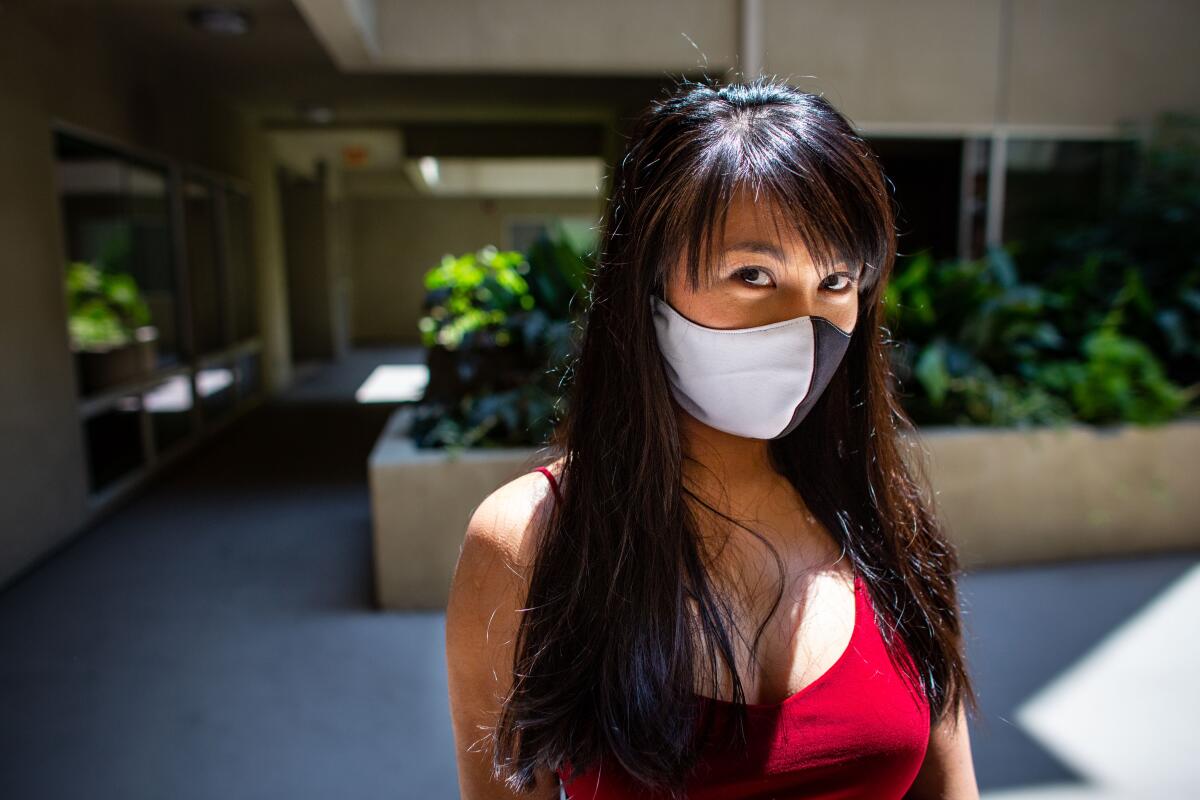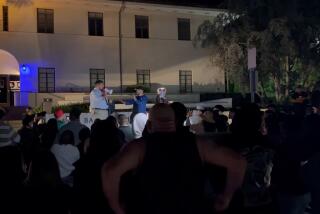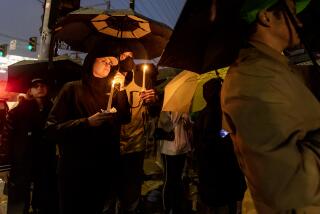Column: She asked her neighbors to wear masks. Then the swastikas and racial slurs appeared

Jaycebelle Tadena was feeling pretty good last week, as she pulled her new car into the garage at her apartment complex in Canoga Park. Then she stepped into the elevator and got the shock of her life.
Its walls had been defaced with hateful messages: “There were two swastikas, one on each side of the elevator,” she recalled. On the other walls, someone had scrawled “die blacks. die Jews.” Along with slurs I will not repeat.
Tadena, 28, trembled as she rode upstairs to her apartment. It was after midnight, but she called the manager and left a voicemail. “I wasn’t quite panicky, but obviously distressed,” she recalled. “I just wanted it gone by the morning, so nobody else would have to see that horrible sight.”
She thought of her Black neighbors. The children were shy, and clung to their parents during elevator rides. “I can only imagine how helpless this might make a parent feel.”

The graffiti hadn’t been there when she left for her job as a Zoom technician that afternoon, but her brother had noticed it that evening. “I realized it had probably been there for four or five hours, without anybody saying anything,” she said.
I could hear the disappointment in her voice. “It’s a nice neighborhood, a comfortable multicultural building,” she said. “The kind of place where, if you live here, you feel like ‘I’m doing well in life.’”
As she walked me through everything that happened that night, I realized her feelings were more complicated than disappointment or sorrow. There was something else.
“I think I might have inadvertently caused this to happen,” she told me. “And I feel terrible about that.”
::
For weeks, Tadena had been troubled by elevator riders not following the rules. Her brother lives with her and works with vulnerable patients at a nursing home. Neither of them can risk contracting COVID-19.
“And every single day, I end up stuck with somebody not wearing their mask in the elevator,” said Tadena, 28. “I ask them very nicely to please wear a mask. But I get a lot of hostility because of that.”
At her request, the manager posted a sign in the elevator last week, reminding residents of the mask requirement. The note went up on Sunday, it was slashed with an ‘X’ on Monday, and on Tuesday the racial slurs and swastikas showed up.
She can’t help but wonder if her mask request triggered the hate-mongering. Tadena is Filipino, not Black or Jewish, and grew up in the San Fernando Valley. “But everything is so polarized right now, there’s a collective anger that’s very noticeable; you lash out at people who are not like you.”
I’m sure she’s seen the same social media videos I have, of adults melting down, toting rifles, throwing tantrums because they object to wearing a mask to help stop the spread of the coronavirus.
In a world where so much seems out of our control, they resent being told what to do. And that resistance has morphed into anger, as we sit at the intersection of COVID-19 and Black Lives Matter.
The battle over masks has become more than a health issue; it’s a reflection of how frightened we feel, how self-centered we’ve become, how suspicious we are of people we don’t know and things we don’t understand.
“I’m still trying to figure it out,” Tadena admitted. She suspects the success of Black Lives Matter protests has generated a backlash and surfaced hidden bigots, who were already nursing pandemic grievances.
“You think about the anger that anyone feels — being cooped up at home, losing their jobs, being forced to think about everything that’s going on in their minds all the time.”
Talking with Tadena reminded me how bewildering this all feels, even as we’re learning lessons about our communities and ourselves.
She feels guilty that her efforts to safeguard her health may have unleashed a stranger’s hatred of Jewish and Black people. “I feel like I have put them in danger even more,” she said, “by the act of requesting people to put on masks.”
And she wishes she wasn’t the only one to raise a ruckus about the hateful things written in the elevator. “I can’t imagine this isn’t a bigger deal,” she said. “Are we just going to pretend this is not happening?
::
Tadena knew enough not to call 911, but she did call a city helpline that night. They dispatched the police; she was surprised when four officers showed up.
They took photos, got statements from Tadena and her brother and checked to see how much damage had been done. Then the officers grabbed rags and scrubbed the swastikas and slurs from the wall.
It was the middle of the night, and “there wasn’t much they could do,” she said. “But they took it seriously. It was quite a nice thing, for them to wipe it down so nobody else would have to see it.”
She hadn’t expected the police to fix it. “I just wanted to have it on the record,” she told me. She thought about all the neighbors who had ridden the elevator that night, and imagined their stomachs churning with the hurt she’d felt.
“I would want my experience to be documented, for it to count,” she declared. “It’s incredibly important for the story to be told, to have people’s experience validated, not just for now but for the generations to come.”
More to Read
Sign up for Essential California
The most important California stories and recommendations in your inbox every morning.
You may occasionally receive promotional content from the Los Angeles Times.











